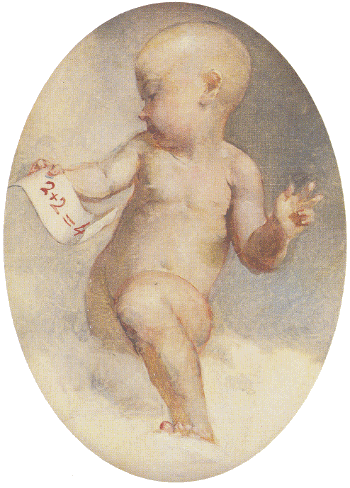Science in a Hundred Words
January 26, 2012
Children often offer unique insights into everyday situations, possibly because their logic is unencumbered by
social convention. From this idea, we get the
idiom, "Out of the mouths of babes." The full idiomatic expression is, "Out of the mouths of babes and sucklings...," which appears twice in the
Bible (
Psalms 8:2 and
Matthew 21:16). Since the word, "
suckling," is not part of
normal conversation, that part is never said.
This idea was commercialized by the
television series, "
Kids Say the Darndest Things," a spin-off from
House Party, a long running
radio show hosted by
Art Linkletter. In this program, children were interviewed with the expected comical consequences. The
inventors among us will be interested to note that Linkletter was a major investor in the commercialization of the
hula hoop.

Never too young for science!
An artistic representation of science as a cherub. It's interesting that the artist identifies science with mathematics.
La Ciencia (Science), oil on canvas, c. 1884, by the Spanish artist, Antonio Cortina Farinós (1841-1890).
(Via Wikimedia Commons))
In a 2008 letter to
Nature,[1] Marco Prunotto of the Nephrology Unit Laboratory,
Giannina Gaslini Children's Hospital (Genoa, Italy), described a
science crowdsourcing study with
high school aged children, aged 16-18. This was done in the context of a workshop sponsored by the
San Paolo Fondazione per la Scuola and Fondazione Venezia. The idea of this study was simple - The high school aged children from
Italian schools were tasked with developing a list of a hundred words that they believed embodied science as practiced today.
There was one thing done in this study that I, as an
experimentalist, would not have done. The children prepared the list after listening to a series of
seminars by
scientists, so there might be bias according to the topic areas selected for presentation, and the individual preferences of the scientist presenters. The students, however, had other resources, such as the Internet, books and journals, to guide them. The scientist mentors for this workshop worked in the fields of
Chemistry,
Astronomy,
Physics and
Biology.
That one problem notwithstanding, here's the list.[1-2]
As Marco Prunotto commented in his letter to Nature, there are words on the list, such as acid, base, magnetism, mole and scientific method, that could have been on a similar list a hundred years ago. But there are also words that relate to
ethical issues that would have been absent in an earlier era. Of course, "
Internet" is one word known to only a few just two decades ago, but it's a major part of science today. This blog serves as one example.
References:
- Marco Prunotto, "Shaping science education in just 100 words," Nature, vol. 455, no. 7212 (September 25, 2008), p. 460. A PDF version of the article is available, here.
- The 100 Words (100 parole) web site.
Permanent Link to this article
Linked Keywords: Children; social convention; idiom; Bible; Psalms; Matthew; suckling; vernacular; television series; Kids Say the Darndest Things; House Party; radio show; Art Linkletter; inventor; hula hoop; putto; cherub; science; mathematics; oil on canvas; Spanish; Antonio Cortina Farinós; Wikimedia Commons; Nature; Giannina Gaslini Children's Hospital (Genoa, Italy); crowdsourcing; high school; San Paolo Fondazione per la Scuola and Fondazione Venezia; Italian; experimentalist; seminar; scientist; Chemistry; Astronomy; Physics; Biology; acid; base; galaxy; planet; aggregation; gene; pollution; analysis; gravity; pressure; antimatter; greenhouse effect; probability; apparatus; H2O; protein; atmosphere; heat; pulsar; atom; hydrocarbon; quantum; bacteria; infinity; quark; Big Bang; intelligence; radioactivity; biodiversity; Internet; reaction; bioethics; life; relativity; biosphere; link; research; black hole; light; reproduction; carbon; magnetism; rule; cell; matter; science; chaos; mass; symbiosis; climate; mind; system; cloning; metabolism; solution; DNA; scientific method; space; ecosystem; measurement; species; element; mole; stem cell; electricity; molecule; star; electron; motion; technology; energy; mutation; temperature; entropy; natural selection; theory; environment; nebula; time; enzyme; neuron; tissue; equilibrium; GMO (genetically modified organism); tumor; error; organism; Universe; experiment; osmosis; vacuum; ethology; particle; virus; evolution; periodic table; wave; force; pH; fossil; photosynthesis; ethical issues.